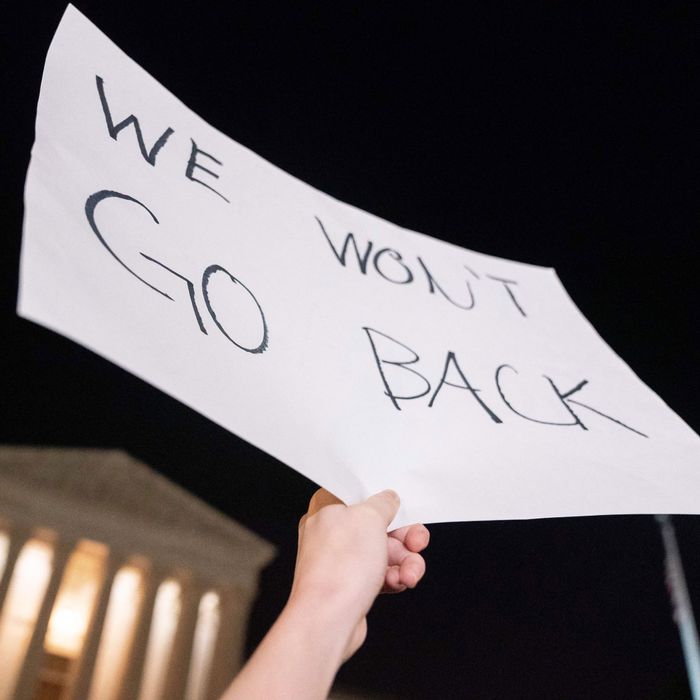
Late Monday night, Politico shook the earth with something no one in modern times had seen before: a prepublication draft majority opinion from the Supreme Court that would upend the lives of millions of Americans by unequivocally overturning Roe v. Wade and Planned Parenthood v. Casey. If Justice Samuel Alito’s 98-page opinion that “Roe was egregiously wrong from the start” is officially issued as it stands by the Court — and this could theoretically change by the end of the term, typically in June — about half the states in the country are expected to ban or severely restrict abortion.
The outcome itself is not the surprise. Anyone who listened to the justices’ oral deliberations on Mississippi’s 15-week abortion ban in December could hear there was a majority to overturn the 49-year-old precedent that kept pre-viability abortion technically legal. (My recap of the argument was headlined “This Is How Roe Ends.”) But its inevitability doesn’t diminish the devastating impact such an opinion would have on real people’s lives.
The Court’s typical process is to take an initial vote in its private conference in the days following argument; then the writing of opinions is tentatively assigned by the chief justice or, if he’s in the minority, the most senior justice in the majority. According to Politico, this outcome had five votes in conference, and “how Chief Justice John Roberts will ultimately vote, and whether he will join an already written opinion or draft his own, is unclear.” A week ago, the plugged-in Wall Street Journal editorial page seemed worried that Roberts would defect and try to take other justices with him. After Politico published the leaked opinion, CNN reported that, according to its sources, Roberts was opposed to completely overturning Roe but was willing to uphold Mississippi’s 15-week abortion ban.
After Roberts, Justice Clarence Thomas is the most senior among the Republican appointees, but he apparently assigned this opinion to Alito. (One reason Thomas might have passed on the writing? His stated views on abortion are even more extreme, and the ability to hold together the coalition might have been in question.)
Almost immediately after it posted, the draft opinion invited theories about who leaked it and why, given the unprecedented affront to the Court’s confidentiality norms:
In the draft, Alito repeats several times that abortion is not explicitly mentioned in the Constitution and that “a right to abortion is not deeply rooted in the Nation’s history and traditions.” (Trollishly, he cites the late Ruth Bader Ginsburg’s process critique of Roe without noting that she believed abortion rights were fundamental to gender equality under the Constitution and should be funded by the government.) Alito rejects the argument that abortion is protected by the due-process clause of the 14th Amendment, but he says similar opinions relying on it that govern “intimate sexual relations, contraception and marriage” are safe because “abortion is fundamentally different. … It destroys what those decisions called ‘fetal life’ and what the law now before us describes as an unborn human being.”
To the longstanding argument, repeated by conservative justices in their nomination hearings, that Roe would be protected by respect for precedent, Alito responds that that principle “does not compel unending adherence to Roe’s abuse of judicial authority.” The answer, he says in the draft, “is to return the issue of abortion to the people’s elected representatives.” He expends considerable energy trashing the opinions in Roe and the 1992 opinion that reaffirmed it, Planned Parenthood v. Casey. (In a sign of how much has changed, all were written by justices appointed by Republican presidents.) He calls Casey’s “undue burden” framework, crafted as a compromise to weaken Roe without overturning it, “unworkable.”
The draft has some obvious nods to other justices’ pet framings of their opposition to abortion. In a particularly noxious footnote, Alito mentions the conservative argument, most prominently boosted in a 2019 Thomas dissent, that some abortion-rights arguments are “motivated by a desire to suppress the size of the African American population,” but he ostentatiously backs away with the assertion, “We do not question the motive of either those who have supported and those who have opposed laws restricting abortion.” Alito addresses the claim that banning abortion would undermine women’s equality, which he refers to as being “unable to compete with men in the workplace and other endeavors,” by suggesting that all sorts of laws make it easy to be pregnant now even outside marriage and, echoing Justice Amy Coney Barrett’s comments in oral argument, women can always just drop off their newborns at the local fire station. “Women are not without electoral or political power,” he adds condescendingly. In fact, he says, more women are registered to vote than men.
Alito’s opinion, apparently joined by four other justices to form a majority, would put into place a legal standard that would open the door to absolute abortion bans at any time and for any reason: “These legitimate interests include respect for and preservation of prenatal life at all stages of development.”
The law the Court was asked to rule on banned abortion at 15 weeks. If CNN’s report is true and Roberts would have wanted to formally stop there, that, too, would have entailed overturning Roe by lifting its half-century-old line on banning abortion before viability and opening the door for more. The one virtue of Alito’s reported draft opinion is how unambiguous it is about what it’s doing.
This post has been updated throughout.
More on life after roe
- ERA Ratification Is Now Up to Trump’s Supreme Court
- The Unlikely Reason RFK Jr. Could Be Rejected by the Senate
- Project 2025’s Mastermind Is Obsessed With Contraception






























